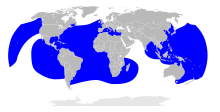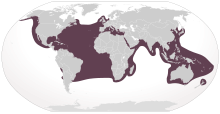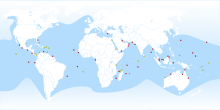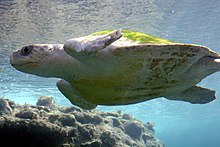List of reptiles of Great Britain
Appearance
| Part of a series on the |
| Wildlife of Great Britain |
|---|
 |
The reptiles of Great Britain include three native snakes and three native lizards. A number of sea turtles visit Great Britain's shores. There are also at least seven introduced reptile species.
| Image | Name | Head (dorsal) | Head (lateral) | Distribution |
|---|---|---|---|---|

|
Common adder (Vipera berus)[1] |

|

|

|

|
Barred grass snake (Natrix helvetica)[2][a] |

|

|

|

|
Smooth snake (Coronella austriaca)[4] |

|

|

|
| Image | Name | Distribution |
|---|---|---|

|
Slow worm (Anguis fragilis)[5][6] |

|

|
Viviparous lizard (Zootoca vivipara)[7] |

|

|
Sand lizard (Lacerta agilis) |

|
Sea turtles (Chelonioidea)
[edit]| Image | Name | Distribution | |
|---|---|---|---|

|
Leatherback sea turtle (Dermochelys coriacea) |

|
Foraging[8] |

|
Loggerhead sea turtle (Caretta caretta) |

|
Vagrant[9] |

|
Green sea turtle (Chelonia mydas) |

|
Vagrant[10] |

|
Hawksbill sea turtle (Eretmochelys imbricata) |

|
Vagrant[10] |

|
Kemp's ridley sea turtle (Lepidochelys kempii) |

|
Vagrant[10] |

|
Olive ridley sea turtle (Lepidochelys olivacea) |

|
Vagrant[11] |
- Red-eared slider, Trachemys scripta elegans[12][13]
- European pond terrapin, Emys orbicularis[14]
- Common wall lizard, Podarcis muralis[15]
- Italian wall lizard, Podarcis siculus[16]
- Western green lizard, Lacerta bilineata[17]
- Aesculapian snake, Zamenis longissimus[18][19][20]
- Grass snake, Natrix natrix[21]
See also
[edit]References
[edit]- ^ "Adder". Woodland Trust. Retrieved 1 April 2022.
- ^ a b Carolin Kindler; Maxime Chèvre; Sylvain Ursenbacher; Wolfgang Böhme; Axel Hille; Daniel Jablonski; Melita Vamberger; Uwe Fritz (7 August 2017), "Hybridization patterns in two contact zones of grass snakes reveal a new Central European snake species", Scientific Reports, 7 (1), Nature: Article number: 7378, Bibcode:2017NatSR...7.7378K, doi:10.1038/s41598-017-07847-9, PMC 5547120, PMID 28785033
- ^ Angela Julian (22 August 2017). "What does the re-classification of European grass snakes mean for our native grass snakes?". Amphibian and Reptile Groups of the UK. Retrieved 13 April 2018.
- ^ "Smooth snake | The Wildlife Trusts". www.wildlifetrusts.org. Retrieved 19 January 2023.
- ^ Václav Gvozˇ dík, David Jandzik, Petros Lymberakis, Daniel Jablonski, Jirˇ í Moravec (2010). "Slow worm, Anguis fragilis (Reptilia: Anguidae) as a species complex: Geneticstructure reveals deep divergences". Molecular Phylogenetics and Evolution. 55 (2): 460–472. doi:10.1016/j.ympev.2010.01.007. PMID 20079858. Retrieved 1 April 2022.
{{cite journal}}: CS1 maint: multiple names: authors list (link) - ^ "Slow worm". Woodland Trust. Retrieved 1 April 2022.
- ^ "Common lizard". Woodland Trust. Retrieved 1 April 2022.
- ^ Rhodin 2011, p. 000.174
- ^ Rhodin 2011, p. 000.172
- ^ a b c Inns, Howard (2009) Britain's Reptiles and Amphibians, Wildguides.
- ^ "Olive ridley turtle found injured off Seaford beach". BBC News. 19 January 2020. Retrieved 19 January 2020.
- ^ Rhodin 2011, p. 000.183
- ^ Wildlife of Britain The Definitive Visual Guide. Dorling Kindersley. 2011. p. 168. ISBN 978-1-4053-6709-7.
- ^ "Terrapin". Canal & River Trust. 11 May 2017. Retrieved 8 August 2017.
- ^ "Common Wall Lizard". Surrey Amphibian and Reptile Group (SARG). Archived from the original on 5 January 2017. Retrieved 16 February 2016.
- ^ Pete Hill (19 November 2020). Alien species of amphibian and reptile in the UK (YouTube video). Amphibian and Reptile Conservation on YouTube.
- ^ Amphibians and Reptiles. HarperCollins. 2000. ISBN 978-0-00-220083-7.
- ^ "Wild snake caught on film in north Wales". BBC. 16 May 2006.
- ^ Loeb, Josh (2 September 2010). "Feature: 'The Camden Creature' - An amphibian and reptile trust says our waterways are alive with some exotic creatures". Islington Tribune. Archived from the original on 5 September 2010.
- ^ "Britain's biggest snake - missing from UK for 10,000 years - now back and breeding". Daily Mirror. 11 May 2022. Retrieved 13 May 2022.
- ^ Julian, Angela (8 March 2021). "Enter the Natrix: surveying grass snakes in eastern England by Steve Allain". ARG UK. Retrieved 28 December 2021.
Notes
[edit]- ^ Previously referred to as Natrix natrix helvetica)[2][3]
External links
[edit]- British Reptiles from wildlifetrust.org.uk
- RAUK Identification Guide
- Rhodin, Anders G.J.; van Dijk, Peter Paul; Inverson, John B.; Shaffer, H. Bradley; Roger, Bour (31 December 2011). "Turtles of the world, 2011 update: Annotated checklist of taxonomy, synonymy, distribution and conservation status" (PDF). Chelonian Research Monographs. 5. Archived from the original (PDF) on 31 January 2012.
- Wilkinson, J.W., Baker, J. and Foster, J. Priorities for Non-Native Amphibians and Reptiles in the UK. ARC Research Report 11/02.
